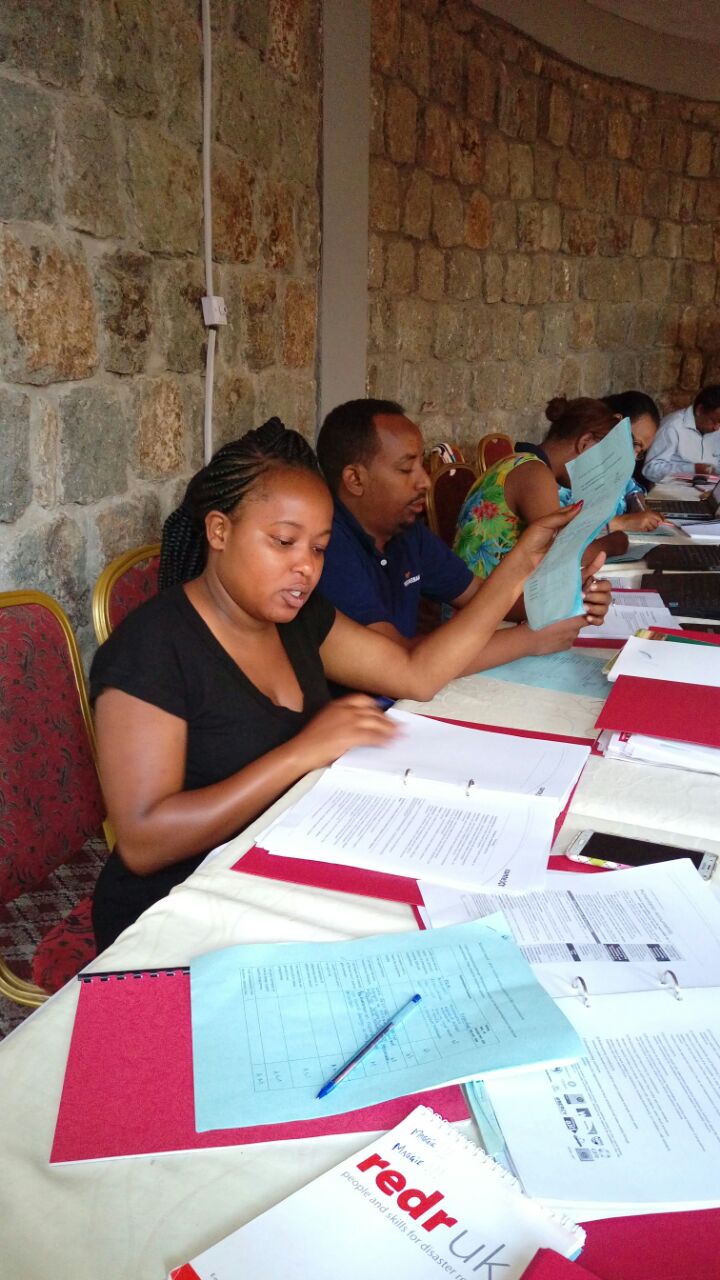As a communications specialist, in development and humanitarian Aid, I have learnt to appreciate the importance of on the Job training. As John Canfield aptly said it “some of the most important things can only be learned in the process of doing them.” For example, four years ago I transitioned from a banker based in Nairobi to a programme officer in the marginalized county of Samburu. The transition process taught me that my passion lies in the service to the communities that we serve. Evidently, most of life is on the job training, and this is one of the things that I have picked from the core skills development course. Throughout the Core Skills Development Course work that run from August 2016 to January 2017, I greatly sharpened my skills in humanitarian programming, leadership in humanitarian response and good working practices.
My self-assessment during the inception stage of the course, revealed gaps in my understanding of humanitarian context and application of humanitarian principles. The first step that I took to improve this competency was to watch video clips on a variety of humanitarian crises and steps taken to respond to the emergencies. I then completed online course on the Sphere handbook. As a result, I interacted with a number of humanitarian guidelines and principles such as: The Humanitarian Charter, NGO Code of Conduct, The Core Humanitarian Standards, and Protection Principles, amongst others. The first face to face workshop that was held in Debre Zeyit- Ethiopia, was an eye opener for me. It gave me an opportunity to interact with different actors in this discourse from Kenya and Ethiopia. I also learnt on the importance of application of these principles in project design, Implementation, Monitoring and phase out.

As part of action learning, I shared resource materials from the course with my colleagues. As a result, 4 staff enrolled for the sphere online course and one staff enrolled for and completed the different needs equal opportunities course. I also placed the NGO and Red Cross code of conduct on the Caritas Maralal notice board.
One other gap that I noted during my self-assessment was a weakness in managing myself in a pressured and changing environment. During the second workshop, we were taken through a session on Managing stress. I realized that implementers also get affected by the pressured and changing environment. Some of the ways that we get affected include: Facing the demands of work –life balance while addressing the needs of the affected population, the element of friction between programme staff and programme support staff, application of procurement guidelines and standards in emergencies, amongst others. Some of these situations can cause trauma. In recognition of this, management in Caritas Maralal organized for a trauma awareness training for all Caritas Maralal staff on 12th and 14th December 2016. This contributed to the improvement of this competency.
Based lessons learnt from the core skills programme, I achieved a three key results; one of my actions plans was to roll out the construction of a resource center in caritas Maralal. Through partnership with Action aid, construction begun in September 2016, after the first workshop. This was made possible through project funds from the Start Network: Shifting the Power project. We plan to equip the center with resource materials relevant to humanitarian response. We will also mentor interns interested in community development through this center. Caritas Maralal staff will also access hard and soft copies of resource materials from the Centre. My other action plan was to introduce online learning to my colleagues, and as mentioned earlier one staff completed a course and presented her certificate.
I have also produced a terms of reference for production of a video documentary on “peace building initiatives in humanitarian response”. The objective of the documentary is to produce a documentary that provides a clear compelling narrative on the effectiveness and quality of emergency response during conflict in Caritas Maralal.
Throughout the course work my learning objectives changed. Initially, my top two learning priorities were:
(1) Monitoring and Evaluation
(2) Developing and maintaining collaborative relationships.
Having gone through this course I achieved my learning objectives and so much more. The insight from the online modules, the course facilitators and resource materials provided, greatly influenced this. I also know that there is still room for improvement in certain areas. I want to enroll for a detailed course on Do No Harm and Conflict Sensitivity which I believe will make a significant contribution to my learning Journey.
In conclusion, I can see extensive ways in which I will continue to apply what I have learnt from this course. I know that I will continue to grow and learn throughout the completion of this course and beyond.
I love the piece very informative post
LikeLiked by 1 person
Good research done concerning samburu county and carritas projects implemented in samburu county interested as being partner working with samburu childrens program supported by child fund Kenya.God bless
LikeLike